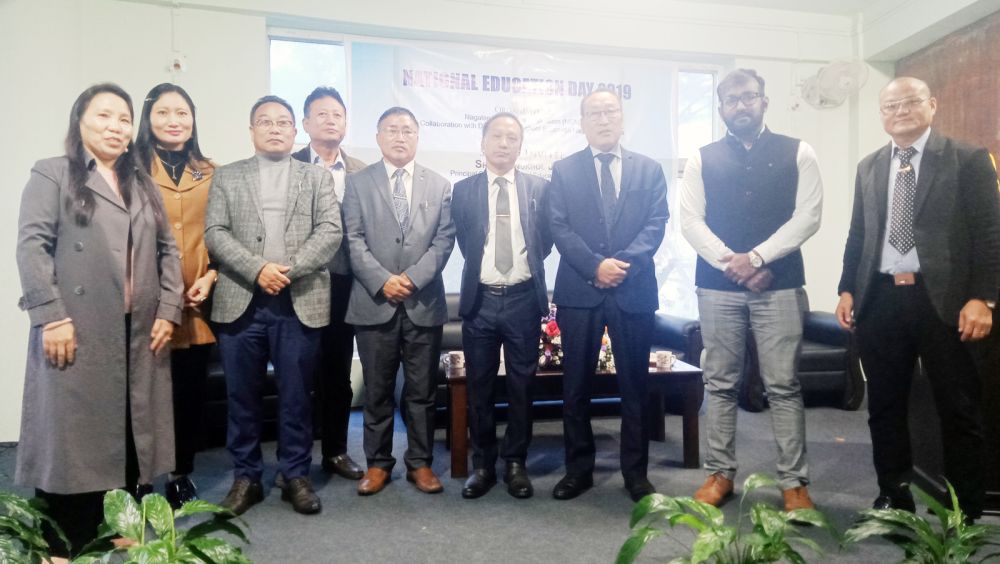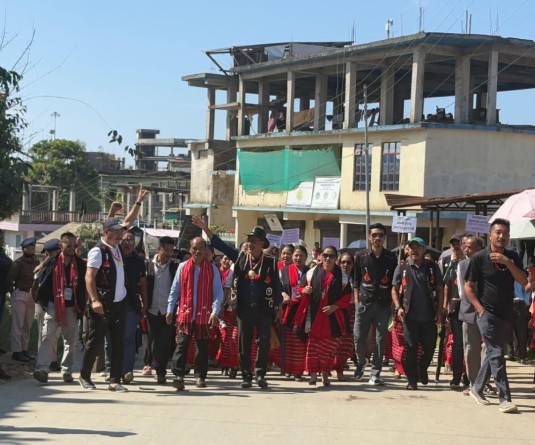Nagaland Education Association appeals for ‘State Policy on education’

NEA team with top government officials of education department during observance of National Education Day held in Kohima on November 11. (Morung Photo)
Our Correspondent
Kohima | November 11
Nagaland Education Association (NEA) president Dr. Zavise Rume today felt that the state government must come out with a strong and a clear-cut state policy on education.
Speaking at the National Education Day here today organized by NEA in collaboration with Directorate of School Education Nagaland at the conference hall of Directorate of School Education, Dr. Rume said that to help make the policy happen, NEA also already launched a policy research on education system in Nagaland.
“We have already collected a huge and comprehensive data on the system of education since the inception of the statehood till today,” he informed.
Dr. Rume recalled that prior to 145 years of school education in Nagaland, there was no proper education system in the modern sense of the term. Prior to the light of modern civilization, the people of Nagaland were living in primitive life and there was practically no iota of literacy or education in its ordinary sense of the term. Modem School Education in Nagaland started with the first school being established in 1874 at Molungyimsen under Mokokchung district of Nagaland by Dr EW Clark, an American Baptist Christian missionary. Even after many years, no school was set up in many tribes of Nagaland. The present education system was inherited from the British rule in India. Naga indigenous education is missing.
He expressed happiness that “Today, we are extremely happy to say that the state government has established too many schools with too many teachers and there is at least one Government school in every village in the state.”
In the past 100 years ago, he said that the school education in Nagaland was progressing so well at its own pace.
“Initially, school education in Nagaland was nurtured by teachers from outside the state. The State Government has been doing well in Education sector. However, despite of this success, there are many loopholes and challenges.
Today, many teachers do not want to teach in the school. Many students do not want to come to school. School absenteeism is becoming a major challenge in Nagaland today. Of lately, our own local teachers started an illegal practice of engaging proxy teachers in their place, which degrades the status of teaching profession. The real person, who receives training on how to teach well, does not actually teach in the school,” Dr Rume lamented and felt that this illegal practice is practiced within the full knowledge of the local Village/Urban Education Committee.
He said the state government is also wasting huge resources, adding “Children in many localities started to desert the government schools: Unless this illegal menace is wiped out, our system of education will be ruined. If we are really sincere, we can easily put this illegal practice to an end. We need a strong state law to deal with menace.”
Emphasizing on the need to have quality education, he said, “We cannot expect quality education from uneducated and unprofessional people. We cannot expect quality education without educationists being involved in the policy decision making process. Professionally qualified and well experienced educationists must be involved in the education policy decision making process. Educationists must be given a fair chance to provide professional opinions in matters related to education like many other professions such as legal, medical, paramedical, engineering, media and so on.
Rume said that the general public must be refrained from making statements on education without proper consultation with the educationists.
“Making random public statements on education related issues by any lay person without proper consultation with educationists are now the real source of confusions in education. There are several instances where several general public and public leaders resort to making public statements on education without proper consultation with educationists, thereby creating confusion in the minds of public and defeating the very objective of many policies and programmes on education like RTE, Communitisation, Continuous and Comprehensive Evaluation, Mid-Day Meal,” NEA president said.
NEA president said that since 2008, the Ministry of Human Resource Development, Government of India has declared 11 November as the National Education Day in commemoration of the birthday of the first education minister of the Independent India, Mulana Abdul Kalam Azad who was a scholar, freedom fighter, promoter of basic education, education of the rural poor and girls, adult literacy, universal primary education, free and compulsory education, diversification of secondary education and vocational training.
“The Nagaland Education Association has been observing this day since its inception to honour and respect educationists and to rededicate ourselves to the cause of humanity and education,” said Dr. Rume.
He said that education is the mother of all professions, adding “Education must essentially become a National agenda. The State Government must continue to give its priority to the Education Sector.”
He said the National Education Day is marked to acknowledge the contributions of educationists and educators for their great contributions towards human progression and civilization.





